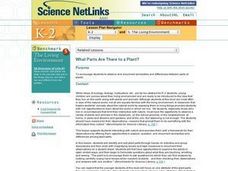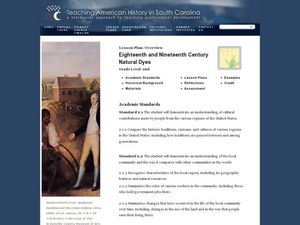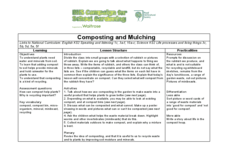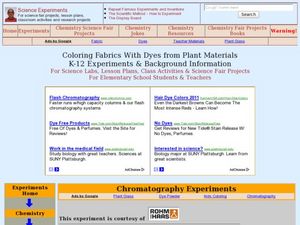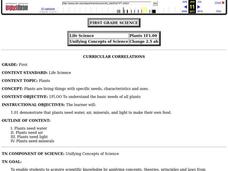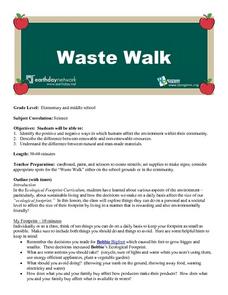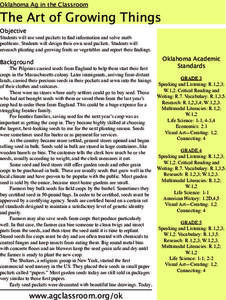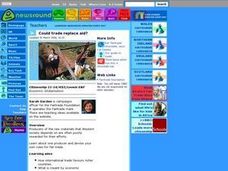Curated OER
The Greening of Mars: The Changes Necessary to Sustain Life on Mars
Fifth graders discuss the currents conditions on the planet of Mars. In groups, they work together to develop a mechanism that allows for a balanced ecosystem to survive on the planet. After presenting their ideas to the class, they...
Curated OER
Creepy, Crawly Critters
Students study characteristics of insects by creating models from an assortment of materials. They create rubrics showing what an insect must have and create an insect, using a bag of materials. They cut out the puzzle insects included...
Curated OER
The Amazing Tomato
Young scholars gain an understanding of where our food comes from. In this plant life lesson, students review what plants need for growth and how long it takes them to grow. Young scholars research which plants it takes to make...
Curated OER
Herb, The Vegetarian Dragon
Students use the Internet. In this reading comprehension lesson, students read the story Herb, The Vegetarian Dragon and answer comprehension questions. Students use the Internet to complete other activities associated with...
Curated OER
Plants And Pollination
Students describe sexual reproduction in plants, including the process of pollination, how insects assist in pollination, and how pollination differs from fertilization. They also explore the importance of honey bees to Arizona agriculture.
Curated OER
What Parts Are There to a Plant?
Young scholars identify and sort plant parts through hands-on activities and group discussions and then work with magnifying lenses and tape measures to document their observations on a student sheet.
Curated OER
Ecology of the Dump
Students determine which types of garbage are biodegradable and which are nonbiodegradable. They practice measuring skills, hypothesizing, taking data, and writing a lab report. Students observe the relative biodegradability of metal,...
Curated OER
THE PEANUT WIZARD
Students read information about George Washington Carver and outline the information. They are given peanuts in the shell, students examine them and eat them. Students discuss the following questions: Why did George Washington Carver...
Curated OER
Paleoclimates and Pollen
Students analyze soil for types of pollen to determine the probably climate conditions. In this earth science lesson, students make conclusions on what a climate is like based on soils samples. Students use a model soil...
Curated OER
Eighteenth and Nineteenth Century Natural Dyes
Second graders explore the work of Americans when it came to coloring materials. In this interdisciplinary lesson, 2nd graders follow the provided steps to make natural goldenrod dye from scratch.
Curated OER
Beanie Baby
Students will explain the importance of soybeans. In this science lesson, students participate in making a "beanie baby" necklace. Additionally, students observe their soybeans for germination and growth for 7-10 days. Students record...
Curated OER
Ag in My Community; Agriculture
Students build knowledge about agriculture as it relates to their communities' commodities. In this agriculture lesson, students brainstorm about conditions in their community with regards to growing different types...
Curated OER
Composting and Mulching
Second graders define composting and recognize what can be composted. In this composting and mulching lesson, 2nd graders classify objects or pictures as good or bad for composting. Students write a story about life in the compost...
Curated OER
Coloring Fabrics With Dyes from Plant Materials K-12 Experiments & Background Information
Students investigate the effects of acid and bases on dyes made with plant materials. For this chromatography lesson students predict color outcomes and complete a lab activity on color combinations.
Curated OER
Plants
First graders explore the specific needs, characteristics, and uses of plants. They discuss the needs of plants as they grow. Students observe plants in various settings as they grow and note the changes they see.
Curated OER
The Mister Runtles' Bet
Students listen to a story dealing with exponential and linear growth. After reading the story, students complete a table comparing information. Using a calculator, students graph the rice and daily population of flies. They study the...
Curated OER
Environment: Waste Walk
Young scholars assess the positive and negative affects of humans on the environment. The lesson explores ways in which individuals and societies can reduce the negative impact on the environment. By taking a "waste walk" around their...
Curated OER
The Urban Heat Island Effect - Lesson 2 (Grades 8-9)
Students use the scientific process to show that when various surfaces are exposed to similar environmental conditions, surface temperatures may vary. They examine the "urban heat island" phenomenon and analyze why it increases energy...
Curated OER
Food Preservation
Students examine the variety of food preservation methods available today. In groups, they participate in an experiment to determine the conditions that encourage or stop the growth of bacteria. To end the lessons, they discuss the...
Curated OER
Sock Walk
First graders, after brainstorming all the ways seeds are scattered and viewing a multitude of examples of seeds, explore how seeds travel by taking a walk outdoors wearing socks over their shoes. In addition, they assess how seeds...
Curated OER
Let's Learn About Lettuce
Students learn more about lettuce. In this agriculture lesson, students listen to their instructor lecture about the history of lettuce. Students then participate in an activity that requires them to compare and contrast iceberg lettuce...
Curated OER
The Art of Growing Things
Students discuss how the Pilgrims brought seeds, from England, into the new settlements and explore the history of seed nurseries. After observing packets of seeds and their contents, students list information found on the packets and...
Curated OER
Could trade replace aid?
Young scholars read and discuss the story "Thirst for Tea Takes Away Childrens' Choices." They work in small groups to role play the roles of shopper, tea picker, and manager of a company that imports and sells teabags. Students write a...
Curated OER
What Do Snails Eat?
Students conduct a food choice experiment with snails, recording the results on a chart to determine what snails eat. In this what do snails eat lesson, students color a picture of snail anatomy, perform the experiment with 3 food...





